-

Nintendo Switch
Best handheld, but which one to choose?
$299 at Amazon
Price alerts on for Nintendo Switch (Neon)
-

Steam Deck
Best newcomer, and handheld of the future
$399 at Valve
-

Analogue Pocket
Best handheld for collectors of old games
$220 at Analogue
-

Panic Playdate
Best super-small indie novelty system
$179 at Panic
-

NEW! CNET Shopping Extension
Get the lowest price on everything
Add CNET Shopping
Handheld gaming consoles have seen a bit of revival over the past few years. Last year was a big one with the release of the Steam Deck and Panic Playdate, as well as the Razer Edge and Logitech G Cloud. And if you’re looking to get back to the days of playing games while on the go, we’ve rounded up some of the best handheld game consoles that 2023 has to offer below.
Phones and tablets already do a fine job of playing tons of great portable games, and have been leading the mobile gaming world for years, offering features like game controller cases and game streaming from consoles, PCs and the cloud. Dedicated devices can provide unique features, exclusive games or extra power to do things your phone can’t. It almost feels like a return to the mid-2010s era of the Nintendo 3DS and PlayStation Vita.
The Nintendo Switch has been the best and most affordable portable game system for years, and continues to be CNET’s clear top pick: At $300 (or $350 for our favorite model), it can play a huge variety of Nintendo games, indie games, it can dock with a TV and can even play some fitness games. But Valve’s Steam Deck offers a unique proposition for those with deeper pockets: It’s large, and it can double as a full gaming PC.
For those who miss retro game handhelds like the Game Boy, you might consider putting yourself on the waiting list to order the Analogue Pocket or Panic Playdate, too, but both of those systems are more niche, and more indie/retro targeted, than the Switch and Steam Deck.
We’ll explain below.

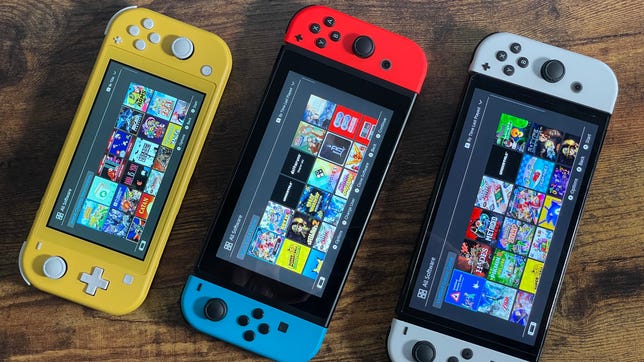
Scott Stein/CNET
Nintendo Switch
Best handheld, but which one to choose?
2019
The Nintendo Switch is over five years old now, but Nintendo has indicated that no true successor is coming right now. A Pro model has been rumored for a while, but in the meantime the existing Switch remains extremely capable, full of great games (including lots of indie offerings), and pretty affordable considering its handheld/TV-connected dual function.
The OLED-screened Switch, which released in October 2021, is the best Switch and our recommended pick. The more vivid and larger display looks fantastic, its rear kickstand works better for tabletop gaming, and both of these upgrades are worth the extra $50. The original Switch (or the V2 version), at $300, works similarly and is also still fine, and occasionally comes in special editions and holiday game bundles. The smaller, handheld-only Switch Lite is a great value pick at $200 for anyone who just wants a basic portable game system, but it lacks any ability to connect to a TV, and its controllers don’t detach. This makes it less versatile for families, and means you can’t replace the controllers if they break.
Read our Nintendo Switch review.
$299 at AmazonGet Price AlertsYou’re receiving price alerts for Nintendo Switch (Neon)

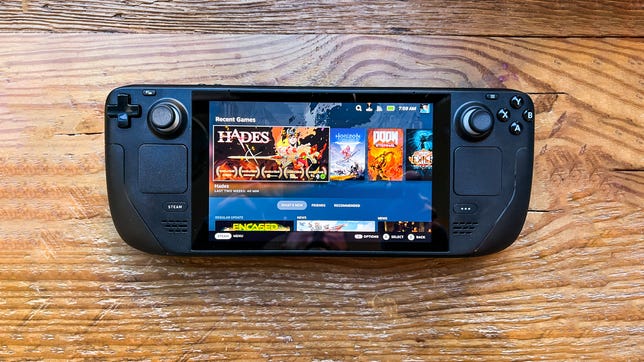
Dan Ackerman/CNET
Steam Deck
Best newcomer, and handheld of the future
Valve’s big and powerful Steam Deck is a marvel. It can play a wide variety of PC games surprisingly well, and is the dream portable for any hardcore Steam fan, or anyone who has a big library of PC games. The Steam Deck can get expensive for the larger storage tiers, but for what it’s capable of, it’s not a bad deal. The ability to play PC games or stream cloud-based games, and to connect to a monitor, keyboard or other accessories, puts the Steam Deck in a class of its own.
Read our Steam Deck review.
$399 at Valve

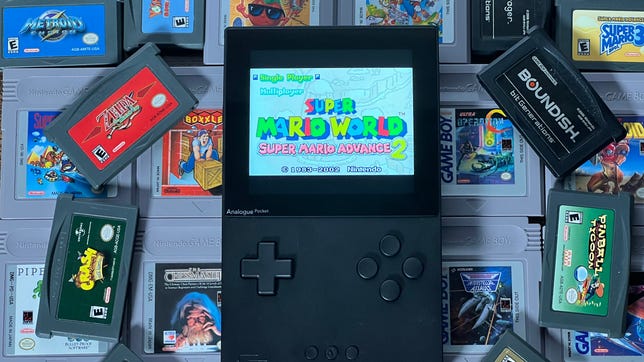
Scott Stein/CNET
Analogue Pocket
Best handheld for collectors of old games
The Pocket looks like a totally remade Game Boy, and it is, in a sense. Analogue’s gorgeous handheld can play original Game Boy, Game Boy Color and Game Boy Advance cartridges perfectly, and can even play Sega Game Gear games using an adapter (Atari Lynx, Neo Geo Pocket and Turbografx-16 adapters are supposed to be coming soon). It has a high-res color screen and USB-C charging, and there’s a separately sold dock for TV play. One of the most exciting updates to the Pocket is its support for FPGA cores that can replicate classic game hardware, and play ROMs. There’s no game store for buying games: Pocket is a system to play classic cartridges or other games in amazing quality, if you want to tinker around with FPGA. There’s also a growing library of Pocket-compatible software in indie gaming channels like itch.io that can be sideloaded to a microSD card, too.
Read our Analogue Pocket review.
$220 at Analogue

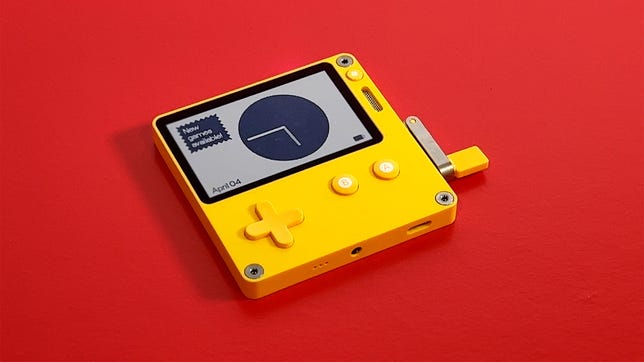
Panic Playdate
Best super-small indie novelty system
The tiny, yellow, black-and-white-screened Panic Playdate looks like a weird Game Boy with a mechanical crank sprouting from its side. But this system, made by the indie game company that developed Untitled Goose Game, plays its own tiny season of 24 indie-developed games, which come included with the purchase and appear over time like weekly presents. The Playdate has Wi-Fi and can download games or sideload other indie-developed titles from sites like itch.io, but you’ll have to learn to love the experiences you discover. We’ve loved playing on it so far, but alas, the Playdate doesn’t have any backlighting — you’ll have to find a lamp instead. The Playdate is on backorder until early 2023.
Read our Panic Playdate review.
$179 at Panic

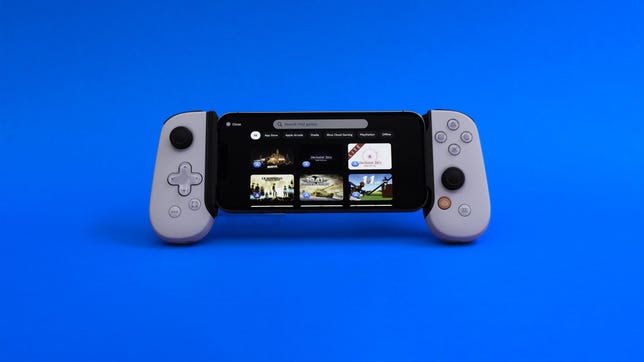
Lori Grunin/CNET
Should I just use my phone or iPad instead?
Tablets and phones are extremely valid game consoles: The iPad has tons of games on the App Store, and hundreds more on Apple’s subscription-based Apple Arcade. The iPad can pair with Bluetooth game controllers, too. iPhones and Android phones have tons of games as well, obviously, and a number of great game controller cases are available, including the Backbone and the Razer Kishi.
Phones and tablets also offer other advantages, including an ability to cloud-stream games on a growing number of services including Microsoft Game Pass Ultimate and PlayStation Plus.
The handhelds listed above have other advantages: unique game libraries, a chance to connect to a TV and play with others, and the capability to play higher-end PC games or classic game cartridges.
Should I wait for something else?
The Nintendo Switch Pro, a long-rumored upgrade to the Switch, could eventually offer 4K gaming and perhaps upgraded controllers, although the existence of such a device is entirely speculative. Odds are that Nintendo will instead just keep slightly improving the Switch via new models every couple of years, similar to how it kept upgrading its Nintendo DS and 3DS line over time.
The Steam Deck just arrived earlier this year, but it’s unclear when and if Valve will ever choose to upgrade it with better processors or newer features. And right now, Microsoft and Sony have stayed out of the handheld gaming picture.
Razer’s Android-based gaming tablet, the Razer Edge, shows where a wave of new gaming tablets could emerge to become the Steam Decks of the mobile world. Right now we don’t have any opinions on whether you should wait for it, because we haven’t played it yet.
Logitech’s streaming-only G Cloud handheld shows where more console/PC accessories could pop up as home handhelds to stream games away from a TV, but right now you’re probably better off using your phone or tablet and a game controller to do pretty much the same thing.
What’s best for kids?
My kids alternate between iPad gaming and the Nintendo Switch. The Switch is without a doubt the best kid console, with the most family-friendly game library and best parental control settings. Still, be prepared to get annoyed at buying multiple copies of games and trudging through the process of creating multiple Switch family accounts.
Game console reviews
- Sony PlayStation 5 Review
- Microsoft Xbox Series X Review
- Microsoft Xbox Series S Review
- Nintendo Switch OLED Review
- Meta Quest 2 Review
- Valve Steam Deck Review
See the latest CNET gaming coverage here.
